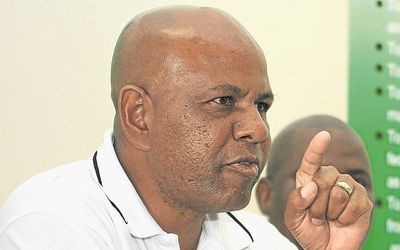THE Association of Mineworkers and Construction Union (Amcu) burst on to the scene in 2012 as a radical alternative to the National Union of Mineworkers (NUM), which it unseated as the majority union on the platinum belt, where the Marikana tragedy unfolded.
Four years on, Amcu, which is seen as unbendable, does not seem to have lost any of the momentum it amassed during the build-up to and aftermath of Marikana.
The brainchild of Joseph Mathunjwa, now its president, Amcu’s roots can be traced back to the Douglas Colliery in Mpumalanga in the late 1990s, when Mathunjwa was expelled from the NUM.
Since then, Amcu had eaten into the NUM’s membership on the platinum belt and swelled its ranks to nearly 200,000. Despite being the backdrop of its founding, however, Amcu is still battling to make inroads in the coal sector.
The platinum sector is gearing up to finish the second round of wage talks with Amcu as the dominant union, not with the NUM.
But Mathunjwa has a bone to pick with capital and the state.
He has accused them of trying to choke off protracted strikes by introducing laws that will stifle labour’s push for a living wage.
"At the National Economic Development and Labour Council (Nedlac ) we are told there are new amendments to the (Labour Relations Act) that are being punted to curb the duration of strikes, because the government and business do not want another successful strike like the platinum strike," Mathunjwa said this week.
READ THIS: Amcu to launch trust fund and housing project for Marikana victims’ families
"A long time ago, Amcu members realised that this union was a major player in labour market trends to the extent that the national laws were being amended to deal with the working-class revolution led by Amcu," he said.
In 2013, the Labour Relations Act was amended to strengthen minority unions’ ability to challenge their recognition. Amcu is widely credited for this as its raison d’être has been its opposition to majoritarianism, which for a long time saw large unions setting the tone in worker issues.
Solidarity general secretary Gideon du Plessis said while Marikana was a disaster, some good had come from soul-searching in the aftermath.
"CEOs and senior politicians realised that labour in the mining industry is not for human resources departments to resolve. Conditions in the mining sector are a microcosm of society."
Another outcome was the focus on labour stability. The discussions at Nedlac may lead to an agreement on strike balloting, but Mathunjwa sees this as a fundamental limitation on the right to strike.
Amcu views collective bargaining as a limit to this right, particularly in the gold sector, where the union has instituted a legal challenge to the definition of the workplace in a bid to strike at shafts where it holds a majority.
Political analyst Ralph Mathekga said the scrutiny of mining was part of a broader trend of community organisations becoming assertive on social justice issues.

ACCUSATION: Joseph Mathunjwa, president of Amcu, says the government does not want another successful strike like the one in the platinum sector. Picture: PUXLEY MAKGATHO
THE Association of Mineworkers and Construction Union (Amcu) burst on to the scene in 2012 as a radical alternative to the National Union of Mineworkers (NUM), which it unseated as the majority union on the platinum belt, where the Marikana tragedy unfolded.
Four years on, Amcu, which is seen as unbendable, does not seem to have lost any of the momentum it amassed during the build-up to and aftermath of Marikana.
The brainchild of Joseph Mathunjwa, now its president, Amcu’s roots can be traced back to the Douglas Colliery in Mpumalanga in the late 1990s, when Mathunjwa was expelled from the NUM.
Since then, Amcu had eaten into the NUM’s membership on the platinum belt and swelled its ranks to nearly 200,000. Despite being the backdrop of its founding, however, Amcu is still battling to make inroads in the coal sector.
The platinum sector is gearing up to finish the second round of wage talks with Amcu as the dominant union, not with the NUM.
But Mathunjwa has a bone to pick with capital and the state.
He has accused them of trying to choke off protracted strikes by introducing laws that will stifle labour’s push for a living wage.
"At the National Economic Development and Labour Council (Nedlac ) we are told there are new amendments to the (Labour Relations Act) that are being punted to curb the duration of strikes, because the government and business do not want another successful strike like the platinum strike," Mathunjwa said this week.
READ THIS: Amcu to launch trust fund and housing project for Marikana victims’ families
"A long time ago, Amcu members realised that this union was a major player in labour market trends to the extent that the national laws were being amended to deal with the working-class revolution led by Amcu," he said.
In 2013, the Labour Relations Act was amended to strengthen minority unions’ ability to challenge their recognition. Amcu is widely credited for this as its raison d’être has been its opposition to majoritarianism, which for a long time saw large unions setting the tone in worker issues.
Solidarity general secretary Gideon du Plessis said while Marikana was a disaster, some good had come from soul-searching in the aftermath.
"CEOs and senior politicians realised that labour in the mining industry is not for human resources departments to resolve. Conditions in the mining sector are a microcosm of society."
Another outcome was the focus on labour stability. The discussions at Nedlac may lead to an agreement on strike balloting, but Mathunjwa sees this as a fundamental limitation on the right to strike.
Amcu views collective bargaining as a limit to this right, particularly in the gold sector, where the union has instituted a legal challenge to the definition of the workplace in a bid to strike at shafts where it holds a majority.
Political analyst Ralph Mathekga said the scrutiny of mining was part of a broader trend of community organisations becoming assertive on social justice issues.




















